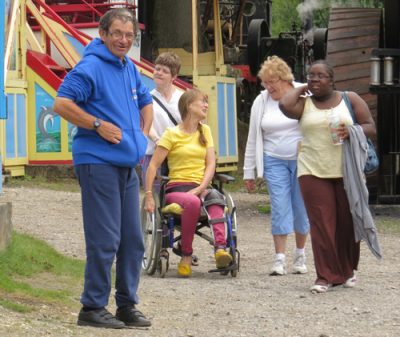Outside Our Four Walls (Ros' Blog)

There are comparatively few instances in the Gospels where we see Jesus in the religious environment. There is the occasion when He was twelve years old and His parents lost Him on their way home from Jerusalem, and found Him in discussion with the religious leaders in the temple. And there was the time at the synagogue, recorded by both Mark and Luke, when He set out the mandate for His ministry, based on His reading from Isaiah 61. At least one of His healings took place at the synagogue.
But these were the exceptions. Jesus was not in the habit of occupying the pulpit; nor did He have a publicity machine that organised campaign meetings with slick advertising. In short, He didn’t expect people to come to Him; He went to where they were.
Jesus was most often to be found in the domestic environment like the home at Bethany, or the workplace, where fishermen were drying their nets, for example. This is why so many of His stories drew on the lives of ordinary people – a woman who has lost a coin from her wedding headband; a farmer scattering seed; a judge refusing to give a woman justice; an employer hiring workers for his grape harvest; a wayward son whose greed leads him to insult his parents and leave home.
Even when He taught large crowds, it was not because He had set up an evangelistic crusade, but because they had followed Him up a mountain or out onto the seashore. He was present with them often enough for them to realise there was something about Him that was worth following.
The early Church followed His model. Yes, we read of them meeting in Solomon’s portico within the temple precincts. But more often we read of them breaking bread from house to house, sitting down and working alongside other tent makers, responding to people they met in the street, or heading for a river bank where they knew the worship of Greek gods would be taking place.
For a long time, the church of the twentieth and twenty-first centuries seems to have abandoned this Biblical model. We build our wheelchair ramps, put in our induction loops and wait for people to come to us. We can’t help it if there are not many disabled people in our congregations; if they don’t come, it’s not our fault. From time to time we hold an evangelistic outreach with a big name speaker in a frantic attempt to get people to come in (although reaching the disabled community is seldom uppermost in the organisers’ minds, I’m sure), with varying degrees of success, often temporary. Hopefully the tide is now turning, but there is still some way to go.
Where would Jesus be if He’d been born today? I’m pretty sure He would be serving at the local food bank, going swimming with the Down’s Syndrome lad next door, having a coffee with the lady in the wheelchair so He can ask her advice about the best present to buy His mother, carrying the shopping home for the elderly veteran in the supermarket queue, accepting a meal from the housebound person who can’t get out to meetings but wants fellowship all the same, helping the blind lady to fill out her forty-two page Employment and Support Allowance form, maybe even asking his deaf neighbour for help filling out His own Job Seeker’s Allowance form!
By the time He had done all that, I don’t think He would be having to look for gimmicks to get people to come to church; if He was there they would go, just to be near Him. I’m sure, in fact, that He would be less interested in 'going to church' than in 'being the Church'. And here’s the mystery of being one with Christ; when we go out and do these things, we’re not just being like Him; we’re not just following His example; we are actually being Christ in those situations. We are bringing Him to the people around us, not in some figurative way but literally. People will gravitate to us, not simply because we’ve been nice to them but because the life of God in us is like a magnet, it’s the power of the Holy Spirit drawing people to Jesus.
My church has recently decided to come out of its four walls and go to where the people are. We’ve sold our building, and are meeting in various locations in the community. It’s not entirely clear how this is going to develop over time, but like Abraham we have obeyed a call to leave home without knowing entirely where we are going, except that God is calling us deep into the heart of our community. I’m not suggesting it would be right for every church to do that; for some their building is what enables them to serve the community. I am encouraging us to try and follow the Biblical model of going where the people are – including disabled people – and not just hoping they’ll come to us.

